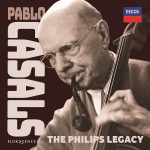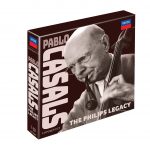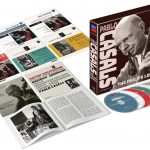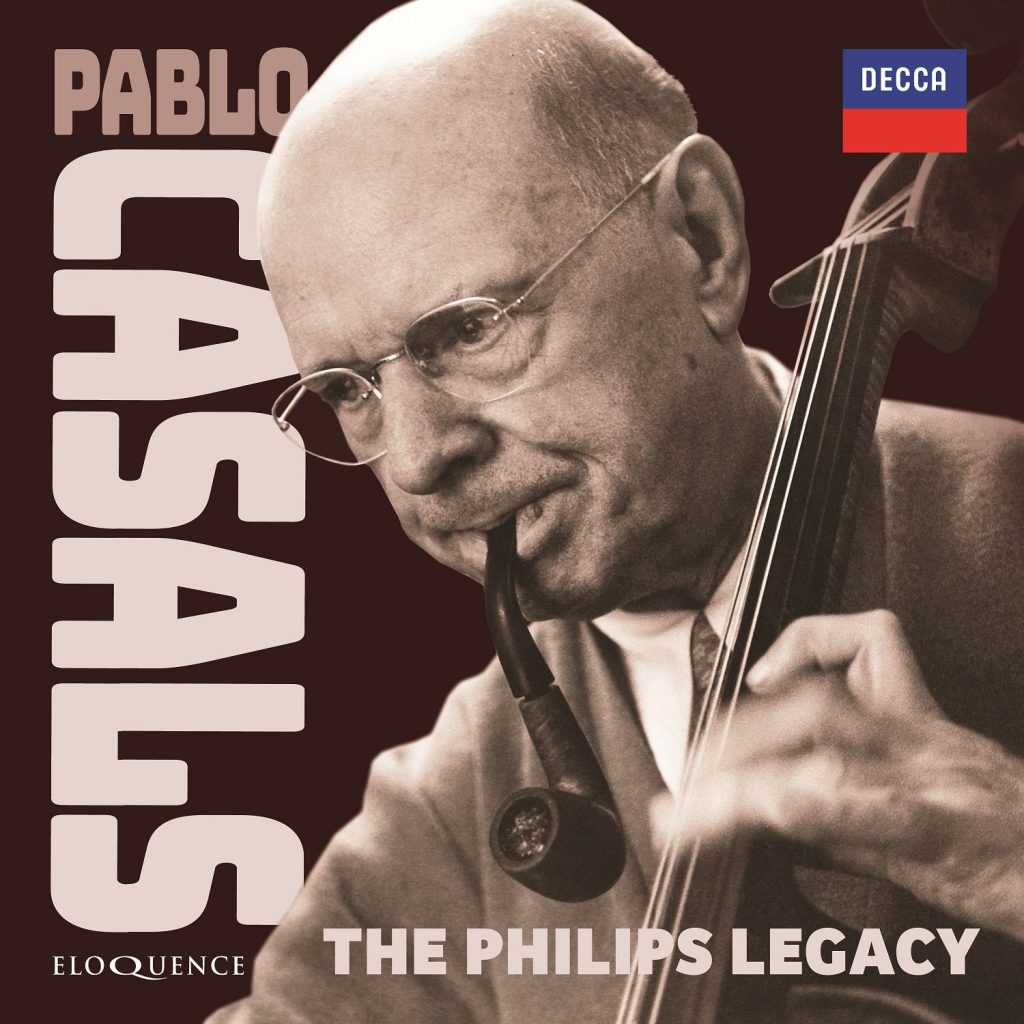

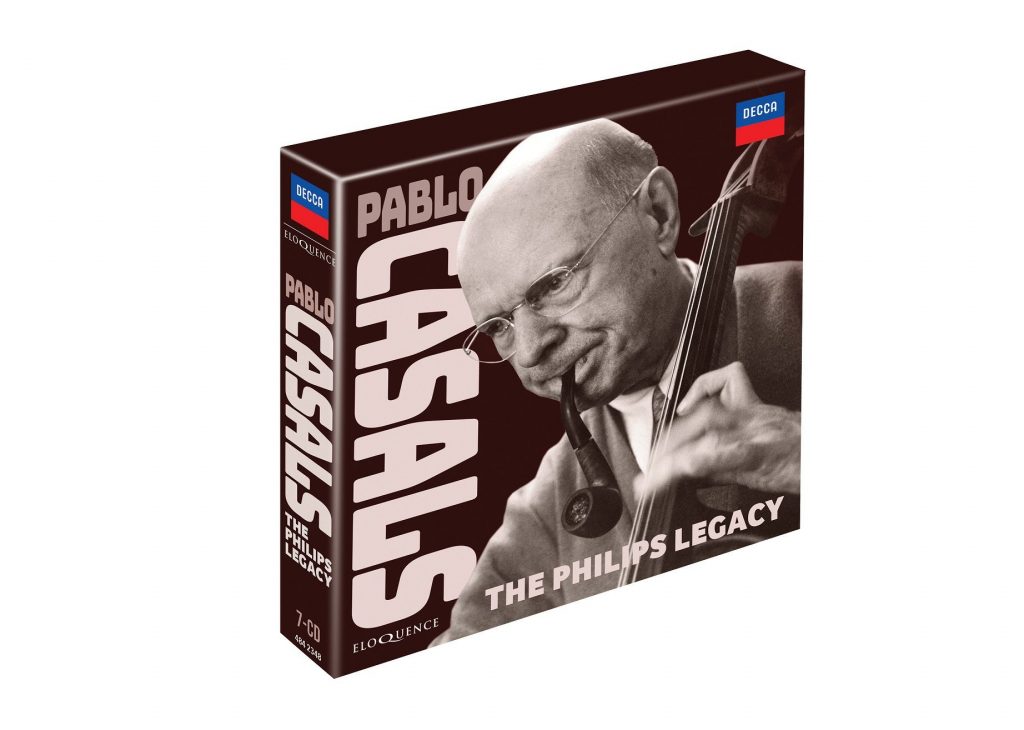
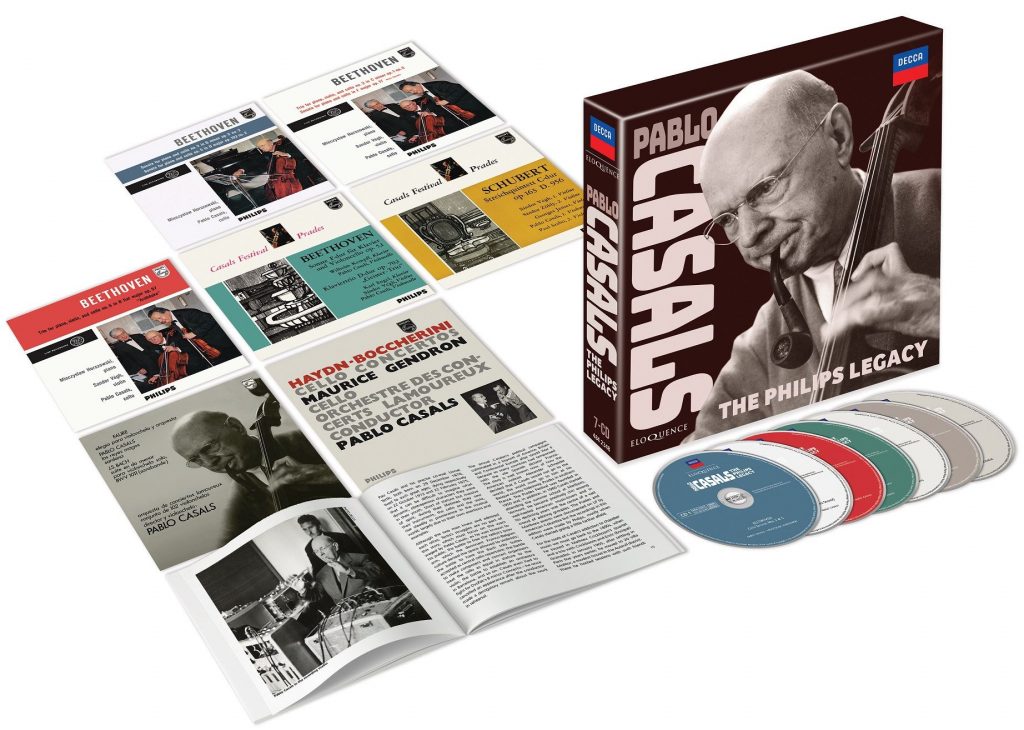
In September 1958, the 81-year-old Pablo Casals took part in the (now annual) Beethovenfest held in the composer’s home city of Bonn. His music-making had lost none of its carefree spirit, and Philips quickly issued these live recordings of Beethoven sonatas and piano trios made in the intimate space of the music room of the Beethoven House. They preserve the cellist on liberated and exhilarating form in a transcription of the Horn Sonata and the Second and Fifth Cello Sonatas, accompanied by the Polish pianist who had been a chamber-music partner since the 1930s, Mieczysław Horszowski.
These understated masters of an essentially 19th-century playing style were joined in three piano trios – including the ‘Ghost’ and ‘Archduke’ – by a Hungarian violinist from a younger generation, Sándor Végh, whose sweet tone and supple rubato also comes from another age. Three years later, at the cellist’s festival in his adopted Pyreneean home of Prades, Philips captured an equally spontaneous account of the First Cello Sonata with Wilhelm Kempff (a mere 66 at the time) and another ‘Ghost’ with Végh and the Swiss pianist Karl Engel. These are performances embodying Casals’s wise and patrician personality as a musician, yet never solemn and always responsive to his colleagues and the spirit of the occasion.
Also captured at the 1961 festival, the account of the Schubert Quintet featured gains special warmth from the Hungarian line-up, in which Végh leads his compatriots Sándor Zöldy, Georges Janzer and Paul Szabo, with Casals taking the second cello part.
The ‘Ghost’ Trio with Horszowski receives a first release on CD in this box, along with another Philips LP made live at the Sorbonne in Paris in October 1956. Casals conducts the Lamoureux Orchestra in a deeply felt performance of Faure’s Elégie, with the solo part taken by the orchestra’s fine cello section in unison. A 25-minute rehearsal sequence brings fascinating insights into Casals’s working methods and his passionate but practical engagement with the music at hand. Casals as conductor in Paris also neatly rounds off the set: the 1960 LP of concertos by Haydn and Boccherini with his pupil Maurice Gendron: aristocratically moulded versions that retain their musical virtues in these period-aware times, and the first-ever recording of the Boccherini to return to the original score rather than the heavily rewritten Grützmacher edition.
CD 1
LUDWIG VAN BEETHOVEN (1770–1827)
Cello Sonata No. 2 in G minor, Op. 5 No. 2
Cello Sonata No. 5 in D major, Op. 102 No. 2
Pablo Casals, cello; Mieczysław Horszowski, piano
CD 2
LUDWIG VAN BEETHOVEN (1770–1827)
Piano Trio No. 3 in C minor, Op. 1 No. 3
Mieczysław Horszowski, piano; Sándor Végh, violin; Pablo Casals, cello
Cello Sonata in F major, Op. 17 (Transcription of Horn Sonata, Op. 17)
Pablo Casals, cello; Mieczysław Horszowski, piano
CD 3
LUDWIG VAN BEETHOVEN (1770–1827)
Piano Trio No. 5 in D major, Op. 70 No. 1 ‘Geistertrio’ (Ghost)*
Trio No. 7 in B flat major, Op. 97 ‘Erzherzog Trio’ (Archduke)
Mieczysław Horszowski, piano; Sándor Végh, violin; Pablo Casals, cello
*FIRST RELEASE ON CD
CD 4
LUDWIG VAN BEETHOVEN (1770–1827)
Piano Trio No. 5 in D major, Op. 70 No. 1 ‘Geistertrio’ (Ghost)
Karl Engel, piano; Sándor Végh, violin; Pablo Casals, cello
Cello Sonata No. 1 in F major, Op. 5 No. 1
Pablo Casals, cello; Wilhelm Kempff, piano
CD 5
FRANZ SCHUBERT
String Quintet in C major, D.956
Végh Quartet; Pablo Casals, cello II
CD 6
HOMMAGE À PABLO CASALS*
GABRIEL FAURÉ
Elégie for Cello and Orchestra in C minor, Op. 24
Rehearsal & Performance
Solo Cellists: Paul Bazelaire, Maurice Maréchal, Gaspard Cassado, Rudolf von Tobel, Etienne Pasquier, André Lévy, Gaston Marchesini, Guy Fallot, Charles Bartsch, Jean Vaugeois
Orchestre des Concerts Lamoureux / Pablo Casals, cello / conductor
PABLO CASALS
Les Rois mages
Sardana
Ensemble of 102 Cellos / Pablo Casals
JOHANN SEBASTIAN BACH (1685–1750)
Sarabande from Cello Suite No. 5, BWV 1011
Pablo Casals, cello
*FIRST RELEASE ON CD
CD 7
JOSEPH HAYDN
Cello Concerto No. 2 in D major, H.VIIb No. 2
LUIGI BOCCHERINI
Cello Concerto in B flat major, G.482
Maurice Gendron, cello; Orchestre des Concerts Lamoureux / Pablo Casals
“Much of Gendron’s edition sounds almost like a new piece: much lighter, wholly charming, and infinitely preferable to the bowdlerized Boccherini of Grützmacher.” Stereo Review, June 1962
“Informal performances by fine artists and good friends.” Stereo Review, January 1964 (Beethoven Trios)
“The epitome of great Beethoven interpretation … In this ideally gruff, granite-like performance one is engaged in a face-to-face confrontation with the Titan himself.” High Fidelity, April 1967 (Beethoven: Piano Trio No 3)
“A historical document of the first importance … The Adagio contains some of the most exquisite and touchingly expressive playing one could ever hope to hear.” Stereo Review, July 1971 (Schubert: String Quintet)
“Schubert is gloriously served, with unusual strength and drive, with heart-melting tenderness, and with Viennese flair in the finale … This is chamber playing of exceptional stature, entirely devoted to the music, and of searching integrity.” Musical Times, February 1983 (Schubert: String Quintet)
“Nothing better demonstrates his indomitable spirit than that first sonata with Wilhelm Kempff … they bring up everything with the immediacy and zest of new discovery.” Gramophone, March 1994 (Beethoven: Cello Sonata No 1)
“How profoundly felt it all is … what mellowness of phrasing they all offer, and what single-minded intuitiveness of ensemble.” Gramophone, March 1994 (Beethoven Trios)

